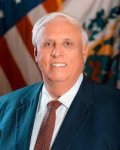West Virginia state government’s monthly revenue report was way up again, this time going into the swirl of the election just a week away.
State revenue for the month of October was almost $148 million ahead of estimates, according to a report distributed by the state Senate Finance Committee. For the fiscal year so far, state government is almost $575 million ahead of projections. The state fiscal year runs July to July.
All this budget success, so far, is against the backdrop of dueling tax cut plans.
West Virginia Senate leaders are urging voters to pass Amendment 2 on General Election ballots. It would allow the Legislature to exempt personal property taxes on people’s vehicles and also on what businesses pay on their inventory, equipment and machinery. The estimated fiscal impact is $550 million a year.
Gov. Jim Justice has been barnstorming to the state to campaign against the amendment, saying there are no fiscal guarantees in the long term and that “doop happens.” Part of the governor’s pitch is to, instead, move toward personal income tax cuts, saying those would lead to greater economic growth.
In contending the personal property tax could make the services provided by county governments vulnerable, the governor has regularly talked about effects on regular people, who he often refers to as “Toby and Edith.” “We’re turning our back on Toby and Edith — and you,” Justice said last week in Moundsville.

With today’s release of strong revenue figures, Senate President Craig Blair countered that the state’s financial performance is strong enough to entrust lawmakers to cut personal property taxes. And he said Toby and Edith would benefit.
“Like so many other West Virginians, Toby and Edith are self-employed small business owners who have some inventory and equipment on hand as part of their small business,” Blair, R-Berkeley, stated in a news release.
“A personal income tax reduction of 10 percent won’t help Toby and Edith out a single bit. If we want to make a real difference in Toby and Edith’s life, we free them from that inventory and equipment personal property tax and the property tax on their vehicles and give them the resources to grow their business, provide an even better life for their family, and put even more money back into our economy. It’s a no brainer. This isn’t for big corporations. It’s literally for Toby and Edith.”
The latest state report shows that personal income tax collections are exceeding estimates this fiscal year by $120 million so far and severance tax collections based on natural resources like coal and natural gas are exceeding estimates by $282 million.
Blair said the state budget projections are a clear sign of a solid fiscal picture.
“The surplus numbers tell the story: The time to give the families of West Virginia a tax cut is right now,” he said. “With another month of revenue over estimates, we continue building a reserve that can be used to ensure our counties will remain whole while we give needed tax relief to families and small- and medium-sized businesses.”
.@WVSenatePres joins @HoppyKercheval to discuss the state's budget numbers. WATCH: https://t.co/yCFQ3nm85Y pic.twitter.com/i5oItb2u1o
— MetroNews (@WVMetroNews) November 1, 2022

Justice, during a stop in Parkersburg, suggested state government’s solid finances could come crashing down with a combination of the personal property tax cuts allowed by Amendment Two and any other economic turmoil.
“If we have any bump in the road, any bump in the road then we’re going to be upside down,” Justice said Monday afternoon. “Anything. I don’t care if it’s severance taxes or PEIA is underfunded or matching dollars of the federal government, highways jobs. I don’t care what it is.
“The second you’re underfunded then the Legislature has no recourse but to look at you and say ‘We can’t fund you. Can you do 80 percent? Can you have 80 percent of the police force or 80 percent of the firemen? Can you have 80 percent of the money going to the schools? Because that’s all we’re going to be able to do this year.’ You’ve basically given these giant tax breaks to big giant corporations.”

The current state financial picture is based in large part on high-performing severance taxes, which come from industries known for volatility, said Kelly Allen, executive director of the nonprofit West Virginia Center on Budget and Policy.
And, she said, state government has a wide range of unmet needs that amount to millions of dollars.
“Half of the FY 2023 revenue above estimates is attributable to historically high energy prices via the severance tax. Energy prices vary widely and lead to booms and busts in our economy, and it would not be fiscally responsible to base permanent tax cuts on volatile energy prices,” Allen said.
“A surplus implies that we are meeting the needs of the people of our state and still have revenues above that. But that’s not what’s happening: 4,500 families lost their child care subsidies today because the state hasn’t prioritized child care investments; we have crisis level staffing vacancies at our correctional facilities and schools; we have one of the highest child poverty rates in the country. The surplus is a reflection of unaddressed needs.”

